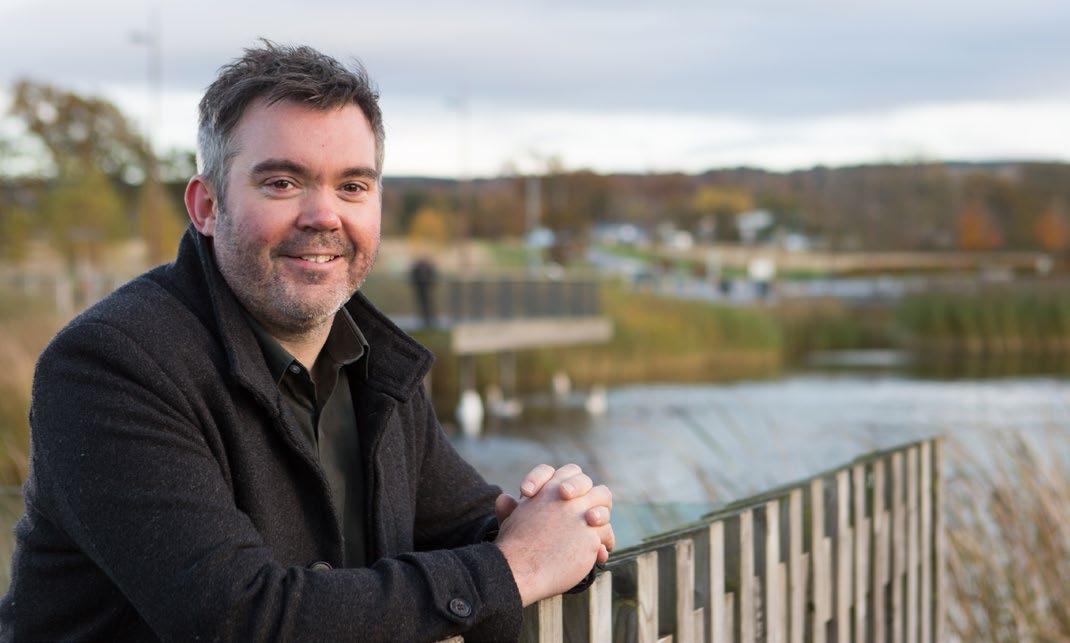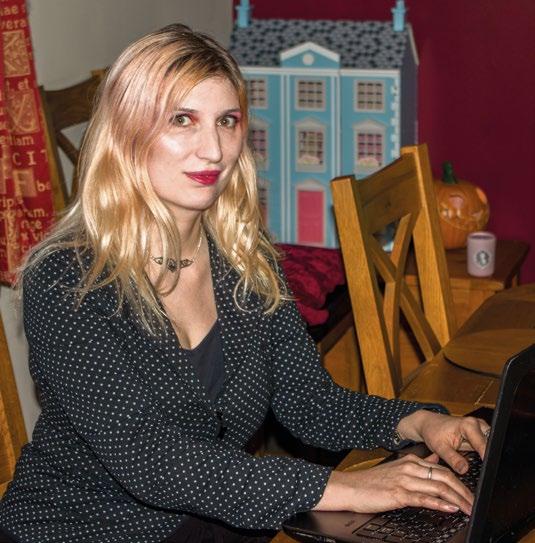
6 minute read
Quality of life attracts new talent
New talent is being attracted to the region as people seek to balance career and quality of life. No longer discounted as remote, the availability of high-speed broadband, air and rail links and an unbeatable natural landscape has led the Highlands and Islands to become a destination of choice for those working in regional industries and a growing remote workforce.
Growing up in bustling Madrid, Cristina Martin never imagined that her career as a lab technician would bring her to the north of Scotland, but having found an ideal role with Inverness-based life sciences firm ODx Innovations, she has thrown herself into a new life in the Highlands.
Advertisement
“I moved to Edinburgh in January 2019,” explains Cristina. “I was looking for work in Scotland and always thought of the Highlands as a beautiful place to visit, but I didn’t expect to find work here in my industry.”
SURPRISING DISCOVERIES
It came as a pleasant surprise then when a friend let Cristina know about the opportunity to join ODx. Founded in 2016, the firm is developing new testing and processing technology to improve care for patients with urinary tract infections and tackle the growing threat of antimicrobial resistance, which could limit medical treatment options in the future.
ODx is just one of several cutting-edge life sciences organisations to be based at HIE’s Inverness Campus. This 215-acre site brings together private companies, research organisations, academia and the NHS to pursue a range of life sciences and technology initiatives focusing on scientific and healthcare disciplines for animals and human beings.
Scotland’s thriving life sciences sector is one of the largest in Europe, providing more than 41,000 jobs across more than 770 multinational corporations, SMEs and start-ups and contributing £2.4bn to the Scottish economy, according to Scottish Development International.

ODx employees based at the Inverness Campus can balance the opportunity to be involved in the development of cuttingedge technology with the ability to create a fulfilling lifestyle outside of work, having found a location where the two needn’t be mutually exclusive.
The chance to combine working in such a specialised industry with living in a setting as spectacular as the Highlands proved too much to resist for Cristina. “I used to spend about two hours on buses every day in Madrid, now I save so much time!”
With that newfound free time, Cristina has been eagerly exploring her new home. As well as taking up cycling for the first time, she walks, hikes and visits new places most weekends.
“Inverness might be a city, but it’s only ever a very short drive to a great beach, or to the mountains. Everything beautiful is close.”
Another ODx colleague, Craig Millar, agrees. A clinical coordinator, Craig moved to Inverness following an NHS career that had taken him from Perth to London, when he and his partner Emma decided to prioritise their quality of life.
CHOOSE QUALITY OF LIFE
“Every day was like Groundhog Day in London,” explains Craig. “I’d spend hours travelling and by the time I got to work I was already stressed out, and eventually I got to a point where I didn’t recognise myself. Emma and I both knew we wanted to make changes and be somewhere we could have a better quality of life.”
With Emma employed as an NHS eye specialist working in an extremely niche discipline, the couple knew it may take a while for them to find somewhere they could both find work. Initially considering the Central Belt, the couple took it as a sign when an orthoptist post ideal for Emma came up in NHS Highland – one of only a handful of relevant roles that become available each year.
“I’d always loved Inverness when visiting friends,” explains Craig “but we hadn’t really considered we might be able to find jobs there in our fields. We came up to check it out and
immediately felt at home, both with the stunning landscape and the friendly people, and we knew the Highlands were exactly what we’d been looking for.”

Although he’d expected to stay within the NHS, Craig was aware of the life sciences industry around Inverness and was immediately open to the opportunity to take on a new role. Now as a clinical link between ODx and their NHS clients, Craig travels to meetings not on stuffy underground trains but through glorious scenery.
“Commuting to work now is actually a pleasure. We drive together to Emma’s base at Raigmore Hospital and then I walk to the Campus. Every day I look around at the castle, the river, the fantastic landscape and think ‘this is why we’re here’.” And with that commute being much shorter, Craig and Emma have noticed a shift for the better in their quality of life.

“We have an evening now after work! From little things like suddenly not needing a filter to drink the tap water to having more free time and amazing outdoor spaces to spend it in, it’s just black and white compared to how our lives were before.”
THE FUTURE IS FLEXIBLE
Craig and Emma aren’t the only ones making more conscious choices about where they live and work and the impact that has on their quality of life. Many employers were increasingly open to flexibility on location even before the COVID-19 pandemic led to a sudden enforced rise in working from home.
When Claire Gerrard’s partner was offered a job that would move the family from Aberdeen to the Isle of Lewis in 2015, she was eager to look at ways to continue in her role as Senior Software Developer for Polaris Learning Ltd, based in Oldmeldrum just outside Aberdeen.
Keen to keep a valued member of their team, Polaris agreed to Claire’s remote working proposal when she demonstrated how she could continue to do her job without being physically based in the office. “As I explained my personal situation and how most of my client contact was already via videoconferencing or telephone, we got to a good place where the management team were happy enough for me to continue working for them – but from our home here on Lewis.” Working from home has many benefits, according to Claire.
“I don’t have all the stress of trying to arrange childcare for starters, but it is a lot more productive too. You’re eliminating the work travel and the costs of it too. You also need minimum preparation time to get to work – you don’t need a packed lunch for example – so you’re just getting up and there you are ready for work. And, of course, there’s not the same distractions you get in an office, which helps too.”

The experience of working from home during lockdown and the removal of the need to be regularly present in a specific office or location is expected to lead to a rise in demand for more permanent flexible working arrangements. The lure of working from home in the Highlands and Islands is proving to be an attractive option for many, particularly those who craved access to outside space during lockdown. Along with Arran in North Ayrshire, homes in the Highlands and Islands were the subject of booming online interest in the summer, with enquiries from buyers from England to Hong Kong as people seek to introduce a greater sense of balance and quality of life amid coronavirus concerns and political upheaval.
Whether working in local industries or connecting remotely to opportunities around the globe, an increasing number of people find the quality of life on offer in the Highlands and Islands an irresistible draw.










